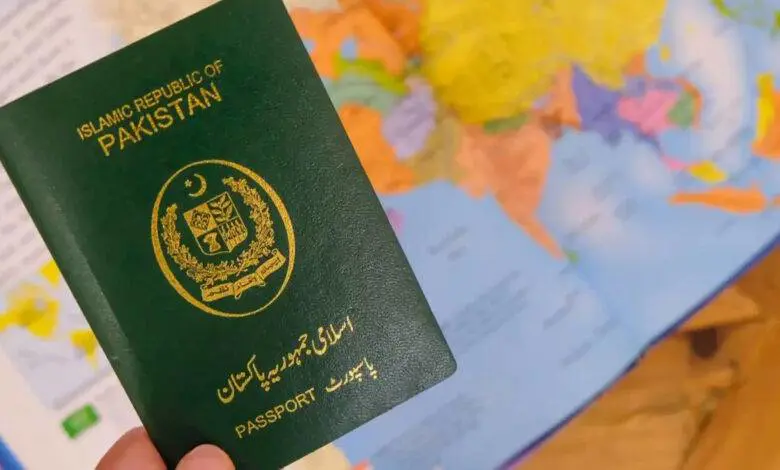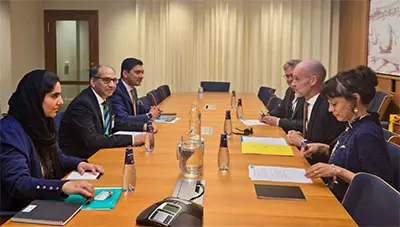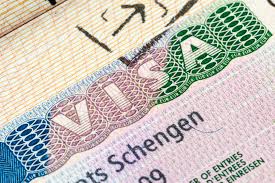
The Pakistani government has announced a significant policy shift aimed at addressing the growing concerns surrounding Pakistani nationals who are being deported from various countries for involvement in illegal activities. This comprehensive strategy involves stringent measures, including the cancellation of passports and the registration of criminal cases (FIRs) against deported individuals. The move comes in response to increasing complaints, particularly from Middle Eastern countries, regarding the involvement of Pakistani nationals in issues such as public begging and undocumented migration, which are seen as tarnishing Pakistan's international image. This article will delve into the details of this new policy, its implications for deported individuals, the legal framework underpinning these actions, and the broader context of Pakistan's efforts to manage illegal migration and human trafficking.
The Rationale Behind the New Policy: Addressing International Embarrassment and Illegal Activities
The primary driving force behind the Pakistani government's decision is the desire to curb activities that cause international embarrassment for the nation. For a considerable period, reports and complaints from host countries, especially in the Middle East, have highlighted the involvement of certain Pakistani nationals in illicit activities. These activities range from public begging and undocumented migration to more serious offenses. The Interior Minister, Mohsin Naqvi, has explicitly stated that deportees are causing "embarrassment for Pakistan at international level," and that "no leniency will be shown to them in the future." This strong stance underscores the government's commitment to protecting Pakistan's reputation and ensuring its citizens adhere to the laws of host countries.
The issue of public begging by Pakistani nationals abroad has been a recurring concern. For example, the Federal Investigation Agency (FIA) reported that approximately 4,000 beggars had been deported by Saudi Arabia from 2022 until the end of 2024. Such figures demonstrate the scale of the problem and the urgency with which the Pakistani government feels it must act. Beyond begging, instances of undocumented migration and fraudulent activities have also contributed to the negative perception. The new policy is designed to send a clear message: engaging in illegal activities abroad will have severe consequences upon return to Pakistan.
Passport Cancellation and Criminal Cases
The core of the new policy revolves around two primary actions against deported individuals:
Cancellation of Passports: This is a crucial step to prevent deported individuals from easily traveling abroad again. By canceling their passports, the government effectively revokes their primary travel document, making it difficult for them to leave the country legally. This measure is intended to act as a deterrent for those contemplating illegal migration or unlawful activities in foreign lands. The passport control list will also be utilized, with deportees being placed on it for a period of five years. This means that even if a deported individual somehow manages to obtain a new passport, their name will flag them for heightened scrutiny at immigration checkpoints, making further international travel significantly challenging.
Registration of Criminal Cases (FIRs): Beyond administrative measures, the government will now register First Information Reports (FIRs) against deported individuals. This signifies a move towards criminalizing the act of engaging in illegal activities abroad that lead to deportation. The nature of these criminal cases will depend on the specific illegal activities that led to their deportation. For instance, if the deportation was due to public begging, the FIR might relate to vagrancy or nuisance laws. If it involved undocumented migration facilitated by human traffickers, the deported individual might face charges related to aiding and abetting human trafficking. This punitive approach aims to hold deported individuals accountable under Pakistani law for their actions that brought disrepute to the country.
The Role of the Interior Ministry and Passport Regulations
The Interior Ministry is at the forefront of implementing these new measures. A high-level meeting chaired by Interior Minister Mohsin Naqvi in Islamabad led to the formal decision to adopt these stringent policies. The Interior Ministry has also formed a committee, led by the Interior Secretary, specifically tasked with strengthening passport rules and regulations. This committee will propose reforms to enhance the passport issuance process and enforce stricter scrutiny. The objective is to make it more difficult for individuals with questionable intentions or a history of illegal activities to obtain passports in the first place.
The strengthening of passport rules and regulations is a critical component of the overall strategy. This involves:
- Enhanced Scrutiny in Passport Issuance: The process of obtaining a passport will become more rigorous, with additional checks and balances to identify potential applicants who might engage in illegal migration or other unlawful activities abroad.
- Blocking Issuance of New Travel Documents: Beyond canceling existing passports, the Interior Ministry had already announced plans to block the issuance of new travel documents to deportees. This reinforces the long-term impact of the policy, ensuring that once a passport is cancelled, obtaining another becomes exceedingly difficult.
- Crackdown on Travel Agents: The government is also focusing on cracking down on travel agents implicated in human smuggling and illegal migration. These agents often facilitate the undocumented migration of Pakistani nationals, sometimes under false pretenses. By targeting the facilitators, the government aims to disrupt the entire chain of illegal migration.
Impact on Deported Individuals: A Life-Altering Consequence
The new policy will have profound and long-lasting impacts on deported individuals.
Loss of International Mobility: The most immediate consequence is the loss of the ability to travel internationally. With their passports cancelled and names on the passport control list, deported individuals will find it nearly impossible to leave Pakistan legally for at least five years, and potentially longer depending on the nature of their offenses and subsequent legal proceedings. This significantly restricts their opportunities for overseas employment, education, or even visiting family abroad.
Criminal Record and Legal Ramifications: The registration of FIRs means that deported individuals will face criminal charges in Pakistan. This could lead to:
- Arrest and Detention: Upon their return, deported individuals might be immediately arrested and detained as part of the investigation and prosecution process for the criminal cases registered against them.
- Court Proceedings and Potential Imprisonment: They will have to face court proceedings, and if convicted, could face imprisonment, fines, or other penalties as prescribed by Pakistani law.
- Difficulty in Employment: A criminal record will severely hamper their chances of finding formal employment within Pakistan, as many employers conduct background checks. This can lead to significant economic hardship for deported individuals and their families.
- Social Stigma: Being deported and facing criminal charges carries a significant social stigma within Pakistani society, impacting their personal relationships and community standing.
Financial Burden: The legal process, including lawyer fees and potential fines, will impose a significant financial burden on deported individuals and their families, adding to the distress caused by deportation.
Limited Re-entry Options: Even after the five years on the passport control list, deported individuals may face extreme difficulty in obtaining new travel documents or visas for other countries, as their history of deportation and criminal charges will likely be flagged by international immigration systems.
Case Studies and Statistics: Understanding the Scope of the Problem
Recent data highlights the prevalence of deportations and the specific reasons behind them:
- Saudi Arabia and Begging: As mentioned, approximately 4,000 Pakistani beggars were deported from Saudi Arabia between 2022 and 2024. This significant number underscores the severity of the issue of public begging by Pakistani nationals in the Kingdom, which is a major concern for both Saudi and Pakistani authorities.
- European Countries and Undocumented Migration: In a separate instance, over 100 Pakistanis were deported from various European countries and arrived in Islamabad just last month. Officials indicated that many of these deported individuals had been involved in fraudulent or undocumented migration. This points to a broader problem of individuals attempting to enter and reside in European nations without proper documentation or through deceptive means.
- Overall Deportation Figures: While specific figures are not readily available for all countries, the consistent flow of deported individuals suggests a systemic issue that the Pakistani government is now determined to tackle head-on. The Interior Minister's emphasis on "no leniency" indicates a firm resolve to reduce these numbers and discourage future instances of illegal migration and illegal activities abroad.
Addressing the Root Causes: Beyond Punitive Measures
While the new policy focuses on punitive measures, a holistic approach to addressing the issue of illegal migration and illegal activities abroad would also involve tackling the root causes. These could include:
- Economic Factors: Poverty, lack of employment opportunities, and economic hardship in Pakistan often drive individuals to seek better prospects abroad, sometimes resorting to illegal migration channels.
- Lack of Awareness: Many Pakistani nationals may not be fully aware of the legal consequences of illegal migration or the specific laws of host countries regarding activities like public begging.
- Human Trafficking Networks: Organized human trafficking networks exploit vulnerable individuals, facilitating their illegal migration and often forcing them into exploitative situations, including public begging.
The government's focus on strengthening passport rules and regulations and cracking down on travel agents involved in human smuggling suggests an understanding of some of these root causes. However, a more comprehensive strategy might also involve:
- Public Awareness Campaigns: Educating citizens about the risks and legal consequences of illegal migration and illegal activities abroad.
- Economic Development Initiatives: Creating more employment opportunities within Pakistan to reduce the incentive for illegal migration.
- International Cooperation: Collaborating with host countries to facilitate legal migration pathways and share intelligence on human trafficking networks.
The Legal Framework: Powers of the Government
The Pakistani government possesses the legal authority to implement these measures. The Passport Act of Pakistan grants the government the power to issue, cancel, and control passports. Similarly, the Code of Criminal Procedure and other relevant laws provide the framework for registering FIRs and prosecuting individuals for criminal offenses. The decision to place deported individuals on a passport control list for five years falls under the executive powers related to immigration and national security.
It is important to note that while the government has broad powers, these actions must ideally adhere to principles of due process and human rights. Deported individuals should have the right to legal representation and a fair trial in the criminal cases filed against them.
Strengthening Passport Issuance and Control
The committee formed under the Interior Secretary to strengthen passport rules and regulations is a crucial element of this new policy. Their mandate likely includes:
- Biometric Verification and Data Integration: Enhancing the use of biometric data and integrating it with national databases to ensure the authenticity of applicants and detect any previous involvement in illegal activities.
- Thorough Background Checks: Implementing more stringent background checks for passport applicants, especially those with a history of travel to countries known for illegal migration or where Pakistani nationals have frequently been deported.
- Inter-Agency Coordination: Improving coordination between the Interior Ministry, Federal Investigation Agency (FIA), and other law enforcement agencies to share information about deported individuals and those involved in human trafficking.
- Review of Passport Categories: Potentially reviewing different categories of passports and their issuance criteria to prevent misuse.
These reforms aim to create a more robust passport issuance process that acts as a gatekeeper, preventing individuals with a propensity for illegal activities from obtaining travel documents.
Challenges and Potential Criticisms
While the government's intentions are clear, the implementation of such a broad policy might face certain challenges and criticisms:
- Due Process Concerns: Ensuring that all deported individuals receive due process and a fair hearing in the criminal cases filed against them will be crucial. Concerns about arbitrary arrests or lack of proper legal representation could arise.
- Distinguishing Between Victims and Perpetrators: It is important to differentiate between individuals who genuinely engaged in illegal activities and those who might have been victims of human trafficking or forced into illicit acts. The policy should have mechanisms to identify and protect victims.
- Economic Reintegration: Deported individuals often return with little to no financial resources and face significant challenges in reintegrating into society. The policy focuses on punishment, but there might be a need for parallel programs to assist in their economic rehabilitation, reducing the likelihood of repeat offenses or further attempts at illegal migration.
- Impact on Law-Abiding Citizens: The tightening of passport rules and regulations should not inadvertently create undue hurdles for law-abiding Pakistani nationals seeking to travel legally for legitimate purposes.
- International Perception: While the policy aims to improve Pakistan's international image, an overly harsh or seemingly indiscriminate application could also attract criticism from human rights organizations and international bodies.
The Bigger Picture: Pakistan's Stance on Migration and Global Relations
Pakistan, like many developing nations, faces complex challenges related to migration. While it is a significant recipient of remittances from its diaspora, it also grapples with issues of illegal migration and human trafficking. The new policy signals a shift towards a more proactive and stringent approach to managing its citizens' conduct abroad. This move is not only about internal governance but also about maintaining positive diplomatic relations with host countries.
The complaints from Middle Eastern countries regarding public begging and undocumented migration by Pakistani nationals have likely put pressure on Islamabad to act. By demonstrating a firm stance against such activities, Pakistan aims to show its commitment to being a responsible member of the international community and to protecting the interests of its citizens who are residing legally abroad.
Conclusion:
The Pakistani government's decision to cancel passports and file criminal cases against deported individuals marks a significant and decisive step towards addressing the issue of illegal activities and undocumented migration by Pakistani nationals abroad. This comprehensive strategy, spearheaded by the Interior Ministry, aims to not only deter future instances of such behavior but also to restore Pakistan's international image.
The imposition of FIRs and placement on the passport control list for five years represents a firm message that engaging in illegal activities abroad will have serious and long-lasting consequences upon return to Pakistan. While the policy emphasizes punitive measures, its implementation must adhere to principles of due process and human rights, ensuring that justice is served fairly. Furthermore, a holistic approach that also addresses the root causes of illegal migration and supports the reintegration of deported individuals will be essential for the long-term success of this policy. This new era of accountability for Pakistani deportees reflects the government's strong commitment to ensuring its citizens uphold international laws and contribute positively to Pakistan's standing on the global stage.
;More Travel News
-
 07-Jul-2025Sweden to Restart Visa Services from Pakistan Soon
07-Jul-2025Sweden to Restart Visa Services from Pakistan Soon -
.jpeg) 11-Dec-2025URGENT MANDATE FOR PRIVATE HAJJ ORGANIZERS (PHOs) FOR HAJJ 2026
11-Dec-2025URGENT MANDATE FOR PRIVATE HAJJ ORGANIZERS (PHOs) FOR HAJJ 2026 -
 15-Mar-2023Tourism in Turkey to Gain Momentum Again in Summer of 2023
15-Mar-2023Tourism in Turkey to Gain Momentum Again in Summer of 2023 -
 11-Oct-2021Best Honeymoon Packages in Pakistan
11-Oct-2021Best Honeymoon Packages in Pakistan -
 25-Mar-2020Noor-ul-Haq Qadri Reject all Rumors about Hajj 2020
25-Mar-2020Noor-ul-Haq Qadri Reject all Rumors about Hajj 2020 -
 24-Apr-2025Pakistan’s First Electricity-Producing Road Set to Launch in Lahore
24-Apr-2025Pakistan’s First Electricity-Producing Road Set to Launch in Lahore -
 08-Jan-2025Will Saudi Airline Fly A Deal's Arrival In Pakistan Make Tickets Cheaper?
08-Jan-2025Will Saudi Airline Fly A Deal's Arrival In Pakistan Make Tickets Cheaper? -
 03-Sep-2025How to Use AI Tools to Find the Best Flight Deals in 2025
03-Sep-2025How to Use AI Tools to Find the Best Flight Deals in 2025 -
 12-Jul-2025Pakistan Government Strives to Ease UAE Visa Hurdles for Pakistani Citizen
12-Jul-2025Pakistan Government Strives to Ease UAE Visa Hurdles for Pakistani Citizen -
 17-Dec-2024Hajj 2025: Final Deadline for Applications Today
17-Dec-2024Hajj 2025: Final Deadline for Applications Today -
 08-May-2025Nationwide Airports Fully Operational: PAA Reassures Air Travel Safety Amidst Regional Dynamics
08-May-2025Nationwide Airports Fully Operational: PAA Reassures Air Travel Safety Amidst Regional Dynamics -
 29-Jul-2025Applying for a Schengen Visa Online: A Comprehensive Guide
29-Jul-2025Applying for a Schengen Visa Online: A Comprehensive Guide
